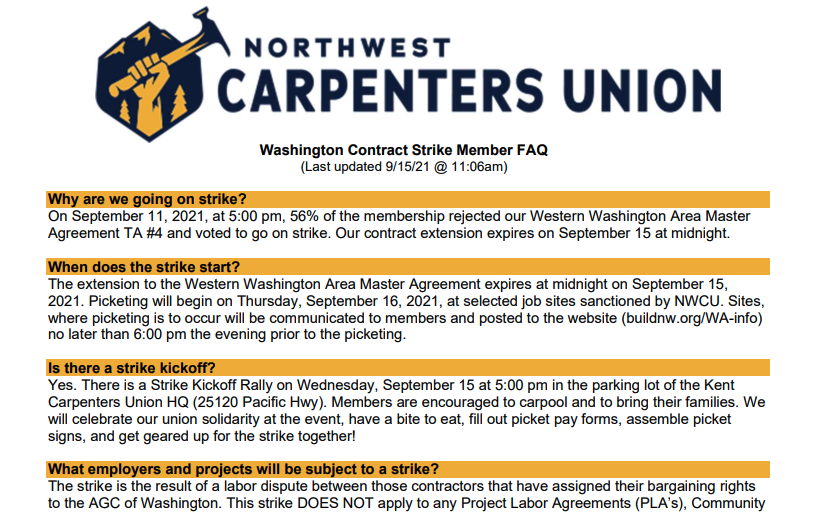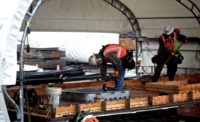Carpenters in western Washington state walked off job sites and picketed Sept. 16 after their contract with the Associated General Contractors of Washington expired a day earlier and members voted to reject a new one.
Between 800 and 1,000 members of the Northwest Carpenters Union were striking, according to Evelyn Shapiro, executive secretary treasurer of the union. The stoppage impacted construction at Microsoft’s main campus and several large build sites in and around Seattle. However, work is continuing on major projects that had no-strike clauses, including Seattle’s future NHL arena, Seattle Public Schools, Sound Transit and the Port of Seattle.
On Sept. 11, 56% of the union members voted to reject the four-year contract, which had been extended from May 31 through Sept. 15 amid negotiations.
The rejected deal included a 20.4% total package of wages and benefits increase over four years, pay raises retroactive to June 1, 2021, increased employer contributions to health care and pensions, stronger protections against harassment and discrimination, more parking reimbursements, greater employer contributions for training and apprenticeship programs and the addition of Martin Luther King Jr. Day as a recognized holiday.
In a statement, the AGC of Washington called the rejected contract “a strong package.”
“The AGC of Washington believes the most recent union proposal that was brought forth for ratification was fair,” the contractors’ group said. “We are disappointed in the outcome but continue to believe that both of our future successes are dependent upon the continuation of our partnership.”
This is the first time since 2003 that the Northwest Carpenters Union has held a strike in western Washington. It comes after members voted down four tentative agreements. Shapiro said the union’s bargaining team is focused on talking to members on the picket lines about the divided votes. No additional bargaining sessions have been scheduled.
“We've got to get together under our strike and get our bargaining strategy going for the next session,” Shapiro said.
One issue that has divided union members is the cost of working jobs in areas like Seattle and Bellevue where housing costs have “just skyrocketed,” according to Shapiro. She said many of the members live two or three hours away from downtown job sites, so they spend more on gas and parking can cost them between $25 and $50 for a day working, or more if they are required to work overtime.
“It’s like a tax on their employment,” Shapiro said.
Shapiro called for elected officials to advocate for parking to be either provided for workers, or for costs to be negotiated by owners and developers.
“It would be a huge lift off construction folks if that wasn’t even on the table,” she said. “At a certain point we have to start understanding the construction industry better and understand how to serve those members.”
The AGC of Washington warned in its statement that the union carpenters could be “eroding” their market share by stopping work.
“Each project built by non‐union workers not only represents lost union wages, but also impacts the stability and security of union fringe benefits through the loss of payments to union Health & Welfare and Pension trusts,” the group said.






Post a comment to this article
Report Abusive Comment